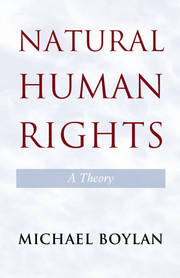Book contents
- Frontmatter
- Dedication
- Contents
- Preface
- Acknowledgments
- Part One Conceptualizing Human Rights
- Part Two Justifications for Human Rights
- Adagio
- 4 Legal Justifications
- 5 Interest Justifications
- 6 Agency Justifications
- 7 Ontology, Justice, and Human Rights
- Part Three Applications of Human Rights
- Glossary
- Bibliography
- Index
- References
7 - Ontology, Justice, and Human Rights
Published online by Cambridge University Press: 05 September 2014
- Frontmatter
- Dedication
- Contents
- Preface
- Acknowledgments
- Part One Conceptualizing Human Rights
- Part Two Justifications for Human Rights
- Adagio
- 4 Legal Justifications
- 5 Interest Justifications
- 6 Agency Justifications
- 7 Ontology, Justice, and Human Rights
- Part Three Applications of Human Rights
- Glossary
- Bibliography
- Index
- References
Summary
As I have argued from the beginning of this book, talk of human rights means something quite different when one believes that human rights are natural as opposed to being conventional. In the first case, human rights would apply to all people on earth from the time (at least) of the appearance of Homo sapiens until they become extinct or until they cease to be essentially rational/emotive creatures who primarily seek to act in order to realize their vision of what is good. As we have seen in Chapters 2 and 3, much of the historical understanding of morality, justice, and some shared community worldview (that is at least consistent with human rights) has been viewed in just this way in Europe and in China (emblematic of the West and the East). This chapter explores this and other ontological issues as they affect my general argument.
Realism and Anti-Realism in Human Rights Discourse
In the second case (human rights as conventional), the currency of human rights will be of much less national and cosmopolitan value. This is because it has lost its necessary universality. Instead, it will depend on social and political forces that will shape and respond to changing conditions within global regions and within countries. And the results may be various – as in the case of women’s rights (for example). Some countries of the world might afford women the same legal rights as men while others do not. If human rights are only conventional, then the picture of human rights is merely one of politics and public relations.
- Type
- Chapter
- Information
- Natural Human RightsA Theory, pp. 196 - 214Publisher: Cambridge University PressPrint publication year: 2014



